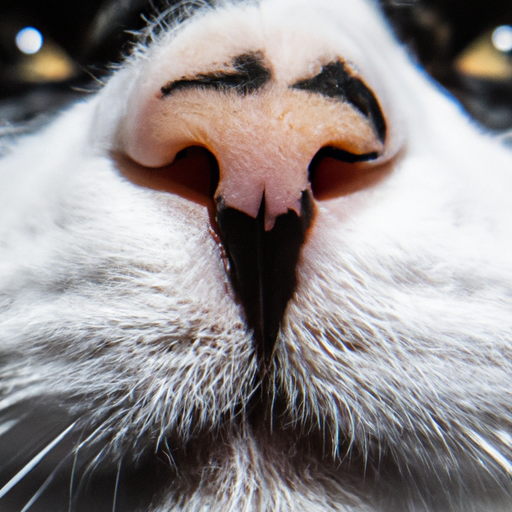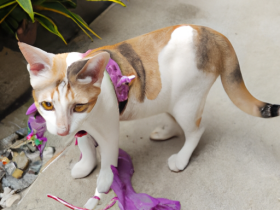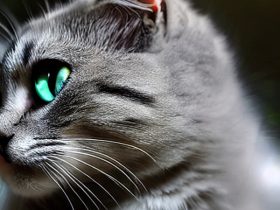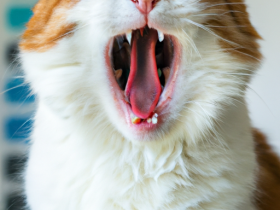“My Cat’s Got the Black Boogers? Get to the Bottom of It with Our Expert Advice!”
Introduction
Cats are known for their cleanliness and grooming habits, so it can be concerning when you notice your cat has black boogers. Black boogers in cats can be caused by a variety of things, ranging from allergies to infections. It is important to understand the cause of your cat’s black boogers in order to provide the best care for your pet. In this article, we will discuss the possible causes of black boogers in cats and how to treat them.
What Causes Black Boogers in Cats?
Black boogers in cats can be caused by a variety of factors. The most common cause is a respiratory infection, such as feline herpesvirus or feline calicivirus. These infections can cause inflammation of the nasal passages, leading to the production of dark-colored mucus. Other causes of black boogers in cats include fungal infections, foreign bodies in the nasal passages, and tumors. In some cases, the discoloration may be due to the presence of blood in the mucus.
If your cat is exhibiting signs of a respiratory infection, such as sneezing, coughing, or nasal discharge, it is important to take them to the veterinarian for a diagnosis. Your veterinarian will be able to determine the cause of the black boogers and provide appropriate treatment. Treatment may include antibiotics, anti-inflammatory medications, or other medications depending on the underlying cause. In some cases, surgery may be necessary to remove a foreign body or tumor.
How to Treat Black Boogers in Cats?
Cats can develop black boogers, also known as nasal discharge, for a variety of reasons. In most cases, the cause is a bacterial or fungal infection, but it can also be caused by allergies, foreign bodies, or tumors. It is important to take your cat to the veterinarian for a proper diagnosis and treatment.
The first step in treating black boogers in cats is to identify the underlying cause. Your veterinarian will likely perform a physical examination and take a sample of the discharge for laboratory testing. Depending on the results, your veterinarian may prescribe antibiotics, antifungal medications, or other treatments.
In some cases, the cause of the black boogers may be environmental. If your cat is exposed to dust, smoke, or other irritants, your veterinarian may recommend removing the irritant from the environment. If allergies are the cause, your veterinarian may prescribe antihistamines or other medications to reduce the symptoms.
If the cause of the black boogers is a foreign body, such as a grass awn, your veterinarian may recommend surgery to remove it. If the cause is a tumor, your veterinarian may recommend radiation therapy or chemotherapy.
In addition to treating the underlying cause, your veterinarian may recommend supportive care to help your cat recover. This may include providing a humid environment to help loosen the discharge, administering fluids to prevent dehydration, and providing a nutritious diet to help boost your cat’s immune system.
It is important to follow your veterinarian’s instructions and monitor your cat’s progress. If the black boogers do not improve or if your cat’s condition worsens, contact your veterinarian immediately.
What Are the Signs and Symptoms of Black Boogers in Cats?
Signs and symptoms of black boogers in cats can vary depending on the underlying cause. Common signs and symptoms include:
• Nasal discharge: Cats with black boogers may have a thick, dark-colored nasal discharge. This discharge may be accompanied by sneezing, coughing, and/or difficulty breathing.
• Swelling: Swelling of the face, eyes, and/or nose may be present in cats with black boogers.
• Loss of appetite: Cats with black boogers may have a decreased appetite or may refuse to eat altogether.
• Lethargy: Cats with black boogers may appear lethargic and may sleep more than usual.
• Bad breath: Cats with black boogers may have bad breath due to the accumulation of bacteria in the nasal passages.
If your cat is exhibiting any of these signs and symptoms, it is important to seek veterinary care as soon as possible. A veterinarian can diagnose the underlying cause of the black boogers and provide appropriate treatment.
How to Prevent Black Boogers in Cats?
Cats can develop black boogers due to a variety of causes, including allergies, infections, and environmental irritants. To prevent black boogers in cats, it is important to take steps to reduce the risk of these conditions.
First, it is important to keep your cat’s environment clean and free of irritants. Vacuum regularly and use air purifiers to reduce dust and other airborne particles. Additionally, keep your cat away from areas where they may be exposed to smoke, chemicals, or other pollutants.
Second, it is important to keep your cat’s diet balanced and healthy. Provide your cat with a high-quality diet that is rich in essential vitamins and minerals. Avoid feeding your cat processed foods or foods that contain artificial additives.
Third, it is important to keep your cat’s immune system strong. Provide your cat with regular veterinary check-ups and vaccinations to ensure their health. Additionally, provide your cat with supplements such as omega-3 fatty acids, probiotics, and antioxidants to help boost their immune system.
Finally, it is important to keep your cat’s stress levels low. Provide your cat with plenty of playtime and interaction to help reduce stress. Additionally, provide your cat with a safe and comfortable environment to help them feel secure.
By following these steps, you can help reduce the risk of black boogers in cats. However, if your cat does develop black boogers, it is important to seek veterinary care to determine the underlying cause and provide appropriate treatment.
What Are the Potential Health Risks of Black Boogers in Cats?
The presence of black boogers in cats can be indicative of a number of potential health risks. The most common cause of black boogers in cats is a respiratory infection, such as feline herpesvirus, feline calicivirus, or feline chlamydophila. These infections can cause inflammation of the nasal passages, leading to the production of black boogers. In addition, cats with respiratory infections may also experience sneezing, coughing, and nasal discharge.
Other potential causes of black boogers in cats include fungal infections, such as aspergillosis, and bacterial infections, such as Bordetella bronchiseptica. These infections can cause inflammation of the nasal passages, leading to the production of black boogers. In addition, cats with these infections may also experience sneezing, coughing, and nasal discharge.
In some cases, black boogers in cats may be indicative of a more serious underlying condition, such as cancer. Cats with cancer may experience a variety of symptoms, including the production of black boogers. In addition, cats with cancer may also experience weight loss, lethargy, and difficulty breathing.
It is important to note that black boogers in cats can also be caused by environmental factors, such as exposure to smoke or dust. If your cat is experiencing black boogers, it is important to take them to the veterinarian for a thorough examination. The veterinarian will be able to determine the underlying cause of the black boogers and provide appropriate treatment.
Conclusion
It is likely that your cat has black boogers due to a respiratory infection or allergies. If your cat is exhibiting other symptoms such as sneezing, coughing, or difficulty breathing, it is important to take them to the vet for a proper diagnosis and treatment. In some cases, black boogers can be caused by environmental factors such as dust or smoke, so it is important to keep your cat’s environment clean and free of irritants. Cats have a unique sense of grooming that often involves picking up bacteria and other objects that may become stuck in their noses. This can create an uncomfortable situation for cats and their owners, as remaining objects can cause unpleasant black boogers to appear.
Black boogers in cats are usually caused by foreign objects, such as grass or dust, which can be inhaled or stuck in the nasal passages of your cat. This can create an uncomfortable situation as the foreign objects can irritate the delicate tissues of your pet’s nose. The foreign object can also lead to a respiratory infection, which could leading to inflammation and a wet, open wound in the nasal cavity.
There are a few things owners can do to prevent black boogers in their cats. Firstly, owners should monitor their pet’s environment, ensuring that their cats are not coming into contact with any objects that could be inhaled or stuck in the nasal passages. Owners should also ensure that their cat’s litter boxes are kept clean, to reduce the risk of bacteria and allergens that could accumulate in the nasal passages. Lastly, it is important to take your cat to the vet if you notice any changes or increased discomfort.
In conclusion, black boogers in cats are usually caused by foreign objects and bacteria that can be inhaled, and owners should take necessary precautions to reduce their pet’s risk of accumulating boogers. If your cat does develop nose boogers, it is important to take it to the vet, who will be able to diagnose the issue and provide a tailored solution.








Leave a Reply
View Comments